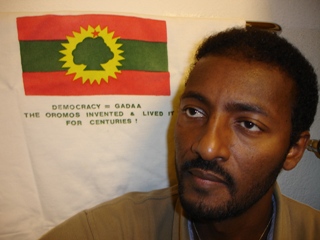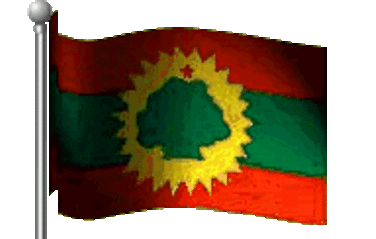ORA appeals to international and local human rights to investigate the ongoing renditon of Oromo refugees from Kenya to Ethiopia against Inter. laws
Mr. Terfa Dibaba, head of the Oromo Relief Association (ORA), appeals to international and local human rights agents to investigate the ongoing rendition of Oromo refugees from Kenya to Ethiopia against international laws.
Source: africanexecutive.com
In the recent past, the rendition of Oromo refugees has been in the news. Kenyan authorities have been accused of illegal rendition of Oromo refugees to Ethiopia under the pretext of cracking down on the Oromo Liberation Front (OLF) militias. While in Ethiopia, the individuals are allegedly arraigned before special courts where they are handed heavy jail sentences ranging from death to life in prison.
The fundamental objective of the Oromo liberation movement is to exercise the Oromo peoples' right to national self-determination and end centuries of oppression and exploitation. The OLF believes the Oromo people are still being denied their fundamental rights by Ethiopian colonialism. According to Terfa Dibaba, head of the Oromo Relief Association (ORA)based in Germany, 21 Oromo refugees have been adducted in Nairobi and Moyale and illegally shipped to Addis Ababa where they have been locked in custody.
Kenya, the host state to the refugees has been accused of violating the 1951 UN Convention and 1967 Protocol on the status of the refugees. According to the Convention, refugees are people who have fled their homes and crossed an international border to escape persecution or conflict.
The Kenya government officials however maintain that those arrested were Oromo Liberation Front militias. According to Francis Kimemia, Internal Security Permanent Secretary, OLF is a gang proscribed in Kenya. However, only a section of refugees have been targeted for illegal repatriation.
“We are demanding that the due process of extradition be put through a court of law,” cautions Dibaba, who blames the entire operation to a section of individuals within the Kenyan government who are operating in cahoots with Ethiopian spy agents. According to the Association, two Nairobi based civil engineers Mesfir Ababa and Tesfahun Camada, were adducted in Nairobi and flown to Ethiopia where they were sentenced to death and to life in prison respectively.
The accusation comes in the wake of a similar backlash after the Kenyan government came under heavy criticism by human rights organization for illegally handing over Kenyans to Ugandan authorities over a bomb blast in Kampala during the recent FIFA World Cup games. The Kenyans were linked to the incident but shipped to Uganda without the due extradition process.
The ORA accuses the Ethiopian government and some elements within the Kenyan government of gross violation of the basic human rights of the Oromo refugees and Kenyans shipped to Ethiopia. Some of the people abducted in Nairobi and Moyale and clandestinely whisked to Ethiopia nad languishing in jail include: Jatani Kuuno, Liban Wario and Milki Doyo. These, ORA alleges, were abducted in a friend’s house in Moyale on August 23 by kenyans enlisted by the Ethiopia authorities and ferried in two Kenya government’s Land Rovers to Ethiopia. Dabaso Kutu, Libani Jatani and Deban Wario were arrested on November 2. They are currently on trial in Ethiopia. Impeccable source have confided that a Kenyan, Abrhim Dambi, the head of the head of Ethiopian Spy network detailed to track down political dissidents has now fled to Addis Ababa where he is hosted by the government after he was exposed.
Accusing both governments of violating the fundamental rights of its citizens, ORA has appealed to local and international human rights agents to investigate the incarceration Mrs Kalla Dakate, 80 years old, with her daughter and 19 other Kenyans being held in Sololo Prison for ostensibly being sympathizers of the Oromo Liberation Front (OLF). They have been tortured and beaten in prison.
The Oromo Liberation Front (OLF) was established in 1973 by Oromo nationalists to promote the right to self-determination for the Oromo people against what they call "Ethiopia colonial rule." It has been outlawed and labeled as a terrorist organization by the Ethiopian government.
However, some observers claim that the OLF has not committed any terrorist act so far. There are reports that the OLF has increased its activity following the general elections of 2005. The OLF has offices in Washington, D.C. and Berlin. Pundits question how OLF could be declared gang while at the same time the Kenya government has embraced the Sudan People’s Liberation Movement (SPLM) till a peace deal was brokered. It is clear that the Oromo row is now the longest liberation war in the region, which appears to have been forgotten.
There is a contradiction in what the government officials say. If indeed, those arrested are criminal gangs, why are they not being arraigned in a court of law instead of being clandestinely smuggled out and handed over to the Addis Ababa government? It is worth noting that in 1991 then President Daniel Moi invited the OLF rank and file in Nairobi. After the parley, the OLF has had a friendly relationship with the Kenyan government. This brings to the fore the question of who the Oromo people and their vanguard political organization the OLF are.
Oromo people are the largest Kushitic group and the second largest nation in Africa. Their population is more than half of the population of the Ethiopian empire. Today, the population of Oromo people is more than 40 million. Oromo people have distinct cultural and linguistic identity of their own. They have inhabited a separate and well defined territory in the Horn of Africa for many centuries.
Their country is called Oromia. It is 600,000 square km in size in Ethiopia. It is larger than France, Italy, Switzerland, Belgium and Netherlands combined together. The Oromo predominately follow three major religions: Islam, Christianity and Indigenous Oromo religion. Before the occupation of their land by Ethiopian empire toward the last quarter of the 19th century, Oromo people lived under democratic political system called Gadaa.
After resisting a military campaign of Ethiopian empire led by Menelik for many years, the Oromo were defeated and made part of Ethiopia not by their consent but by force. It is widely believed that Oromo people’s democratic tradition under Gadaa system has contributed a lot to modern democracy. Oromia borders the Republic of Kenya in the South, Somalia in the South East, in the North Ethiopia and Sudan in the West.
The birth of OLF
Oromia is the richest part of Ethiopian empire. Eighty per cent of Ethiopian coffee export is from Oromia. Oromia contributes 65 per cent of the national revenue of Ethiopia. Majority of gold and other mineral mining in Ethiopia is in Oromia. Oromian Rivers supply all hydro electric power of Ethiopia. Yet today, Oromia is synonymous with abject poverty and because of their political opinion, over thousands of Oromo people are languishing in Ethiopian prison. At the same time thousands are dying from curable diseases such as malaria. Because of fear of persecution, thousands of Oromo fled their country and are living in excruciating conditions. Today, prison centers in Oromia are 10 times the number of schools, hospitals and health centers.
Oromo people’s resistance and demand to regain the independence they lost to Ethiopian empire gave birth to Oromo Liberation Front in 1973. As it is clear from its name; OLF was only established with the fundamental objective of liberating Oromia and establishing Independent Democratic Republic of Oromia. OLF fights for independence of Oromia from the Addis Abba government.
OLF and Transition Government of Ethiopia
After Derg was dislodged from power, a transitional charter was signed between OLF and the party of Mallas by which Transitional Government was established in 1991. The major objective of the Charter and the Transitional Government was to allow referendum by, which Oromo people would freely decide whether they want to be independent or part of Ethiopia.
As almost all Oromo people embraced OLF and it’s objective, TPLF ( Malles Zenawi’s party) started violating terms of the charter and banned OLF’s peaceful political campaign. Finally, Ethiopia's Transitional Government led by Melles declared war on OLF. This left OLF with no option but to defend itself. “As the former President of South Africa, Nelson Mandela said, oppressors determine the mode of the struggle. Ethiopian colonial government determined the mode of Oromo people’s struggle for their right to complete independence. This is why Oromo people’s struggle is the struggle for self defense,” says Dibaba.
It is important to note that there are some Oromo members of parliament in Ethiopia. They serve the political and economic interest of Ethiopia in Oromia. “They are like “home guards” that were fighting alongside the British forces against Mau fighters during Kenyan people’s struggle for independence from British. As “home guards” never represented Kenyan people during British occupation of Kenya, these Oromos with seats in Ethiopian parliament do not represent Oromo and Oromia,” Dibaba observes.
The way forward
From the onset, OLF has respected territorial integrity of Kenya and all its neighbouring countries including their international boundaries. According to the ORA, these countries went through the same colonial history as Oromo people. “Oromo people have the legitimate right to defend and liberate themselves to join the free people of the world.”
In as far as there is no peaceful and democratic means through which Oromo people can decide their political status, the only option left for this people is an armed struggle. According to the OLF rank and file, in its fight for independence, Oromo people do observe all rules of war and therefore, abhors any act of terrorism that targets innocent civilians. As the recognition of the inherent dignity and of the equal and inalienable rights of all members of human family is the foundation of freedom, justice and peace in the world, the realization of the right to independence of Oromo people is the foundation for peace in the Horn of Africa.
By Kasembeli Albert.
The author is Editor of Business Journal Africa, a business and Finance Magazine



0 Comments:
Post a Comment
<< Home